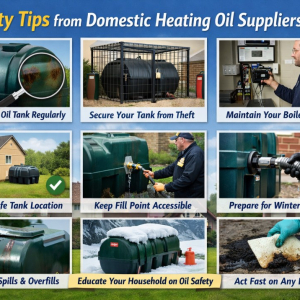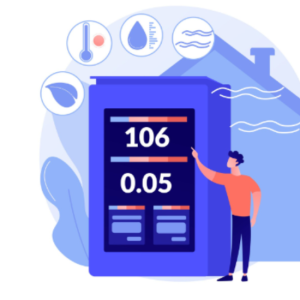Choosing a domestic fuel supplier might seem like a simple decision—after all, you just need someone to deliver heating oil, LPG, or gas to keep your home warm and running smoothly. However, for thousands of households across the United Kingdom, the process isn’t as straightforward as it looks on the surface. Many homeowners unknowingly make critical mistakes when selecting a supplier, costing them money, peace of mind, and even long-term security of supply.
I’ve seen first-hand how small oversights can lead to big consequences for consumers. If you’re in the process of choosing a domestic fuel supplier, this guide will help you avoid the most common pitfalls and make a more informed decision that benefits both your household budget and your lifestyle.
1. Focusing Only on Price
Perhaps the biggest—and most predictable—mistake people make is chasing the lowest headline price. While we all want to save money, choosing a fuel supplier solely because they appear cheaper can backfire in several ways.
-
Hidden Fees: Some suppliers advertise low prices but include delivery surcharges, admin fees, or penalties for smaller orders.
-
Quality of Service: Cheaper doesn’t always mean better. If the supplier cuts corners on delivery schedules or customer service, you may end up regretting your decision when a cold snap arrives.
-
Long-Term Costs: Introductory offers often expire after a few months, leaving you with higher ongoing prices than competitors.
Tip: Instead of comparing just the cost per litre, evaluate the total package—service reliability, contract terms, and transparency of pricing.
2. Ignoring Contract Terms and Small Print
In the rush to secure a deal, many UK households overlook the fine print of their fuel supply agreements. This can lead to nasty surprises later on. Common issues include:
-
Automatic Renewals: Some contracts roll over without your consent, locking you into another year of service at a higher price.
-
Early Termination Fees: Leaving a supplier before the end of the contract can sometimes mean paying hefty penalties.
-
Minimum Purchase Requirements: Certain suppliers set thresholds for order size, which may not suit smaller households.
Tip: Always read the terms carefully and clarify any clauses you don’t understand before signing. A reputable supplier will be transparent about conditions and happy to explain them.
3. Overlooking Delivery Flexibility
Not all suppliers operate with the same delivery flexibility. If you live in a rural part of the UK, for example, you may require more frequent deliveries due to weather risks or limited storage.
Mistakes happen when customers assume:
-
Deliveries can be scheduled at short notice.
-
Suppliers will always deliver on weekends or during bank holidays.
-
They’ll receive priority in bad weather.
Tip: Ask about delivery windows, emergency call-outs, and seasonal service levels. It’s often worth paying a little more for a supplier with strong logistics and contingency planning.
4. Failing to Check Supplier Reputation
In today’s digital-first world, it’s astonishing how many people still neglect to check reviews, testimonials, or industry reputation before signing up with a domestic fuel supplier.
-
Online Reviews: Sites like Trustpilot or Google Reviews provide real insights into customer experiences.
-
Local Recommendations: In rural UK communities, word-of-mouth can be more reliable than online ratings.
-
Trade Associations: Reputable suppliers often belong to associations like UKIFDA (UK & Ireland Fuel Distributors Association).
Tip: Treat this decision the same way you’d treat choosing a solicitor or builder—research thoroughly, compare multiple providers, and look for signs of credibility.
5. Not Considering Payment Options
Different households have different cash flow needs, but many people lock themselves into rigid payment terms without exploring alternatives. Common payment-related mistakes include:
-
Paying Upfront Without Question: While bulk upfront payments sometimes offer discounts, they tie up household cash.
-
Ignoring Budget Plans: Some suppliers offer monthly payment schemes to spread costs evenly across the year.
-
Overlooking Direct Debit Discounts: Certain companies provide small savings for customers who pay by direct debit.
Tip: Choose a supplier with flexible payment structures that suit your household’s financial situation.
6. Forgetting About Customer Service
Price and product matter—but customer service is what you’ll remember when things go wrong. A common error is failing to evaluate how responsive and helpful a supplier is before committing.
-
Slow Response Times: In freezing conditions, waiting days for a reply can be disastrous.
-
Limited Communication Channels: Some suppliers still rely only on phone calls, with no email or online portal.
-
Lack of Local Knowledge: Suppliers unfamiliar with rural UK logistics may not understand the urgency of timely deliveries.
Tip: Test their customer service before signing up—call, email, or chat with them and see how quickly and clearly they respond.
7. Assuming All Fuel is the Same
Another frequent misconception is that fuel quality doesn’t vary much from one supplier to another. In reality, it can.
-
Premium Heating Oils: Some suppliers offer additives that improve efficiency and reduce boiler wear.
-
Eco-Friendly Options: With the UK’s net-zero targets, cleaner fuels or blends may be available to environmentally conscious households.
-
Consistency of Supply: Reliable sourcing ensures your fuel meets quality standards consistently.
Tip: Ask about the types of fuel available, whether premium options are worth the extra cost, and if your supplier is making progress toward greener solutions.
8. Overlooking Environmental Commitments
More and more UK homeowners are considering the environmental footprint of their energy use. A mistake is ignoring whether your supplier aligns with this growing priority.
-
Carbon Offsetting: Some suppliers offer carbon-offsetting schemes for deliveries.
-
Green Initiatives: Are they investing in sustainable fuels like HVO (Hydrotreated Vegetable Oil)?
-
Local Partnerships: Using local distribution hubs can reduce transport-related emissions.
Tip: Even if your main priority is cost, choosing a supplier with a greener ethos could protect your household against future regulatory changes and rising carbon costs.
9. Ignoring Tank Safety and Maintenance Support
Many people assume fuel suppliers are only responsible for delivery, but overlooking their role in tank safety and maintenance is another common misstep.
-
Compliance: Suppliers should advise on legal requirements for storage, especially in environmentally sensitive areas.
-
Maintenance Checks: Some offer free or discounted tank inspections to prevent leaks or breakdowns.
-
Insurance Guidance: A reputable supplier will highlight risks and help ensure you’re properly covered.
Tip: A good supplier isn’t just about fuel—it’s about safeguarding your system and your home.
10. Choosing in a Hurry
Finally, perhaps the most human mistake of all: rushing the decision. Many homeowners wait until their tank is nearly empty before calling around for quotes. In desperation, they choose the first supplier who can deliver quickly—often without due diligence.
Tip: Plan ahead. Monitor your tank levels, research suppliers when you’re not under pressure, and build a relationship with one you can trust long-term.
Conclusion: Smarter Choices Mean Warmer Homes
Selecting the right domestic fuel supplier in the UK is not just about convenience—it’s about balancing cost, service, flexibility, and long-term security. By avoiding the common mistakes outlined above, you’ll be in a far stronger position to secure a supplier who not only keeps your home warm but also provides peace of mind throughout the year.
Remember:
-
Compare more than just price.
-
Read the fine print.
-
Look for a partner, not just a provider.
The domestic fuel market is competitive, and that competition benefits you—as long as you approach the choice with awareness and care. Make the right decision today, and you’ll thank yourself when winter’s chill inevitably arrives.





